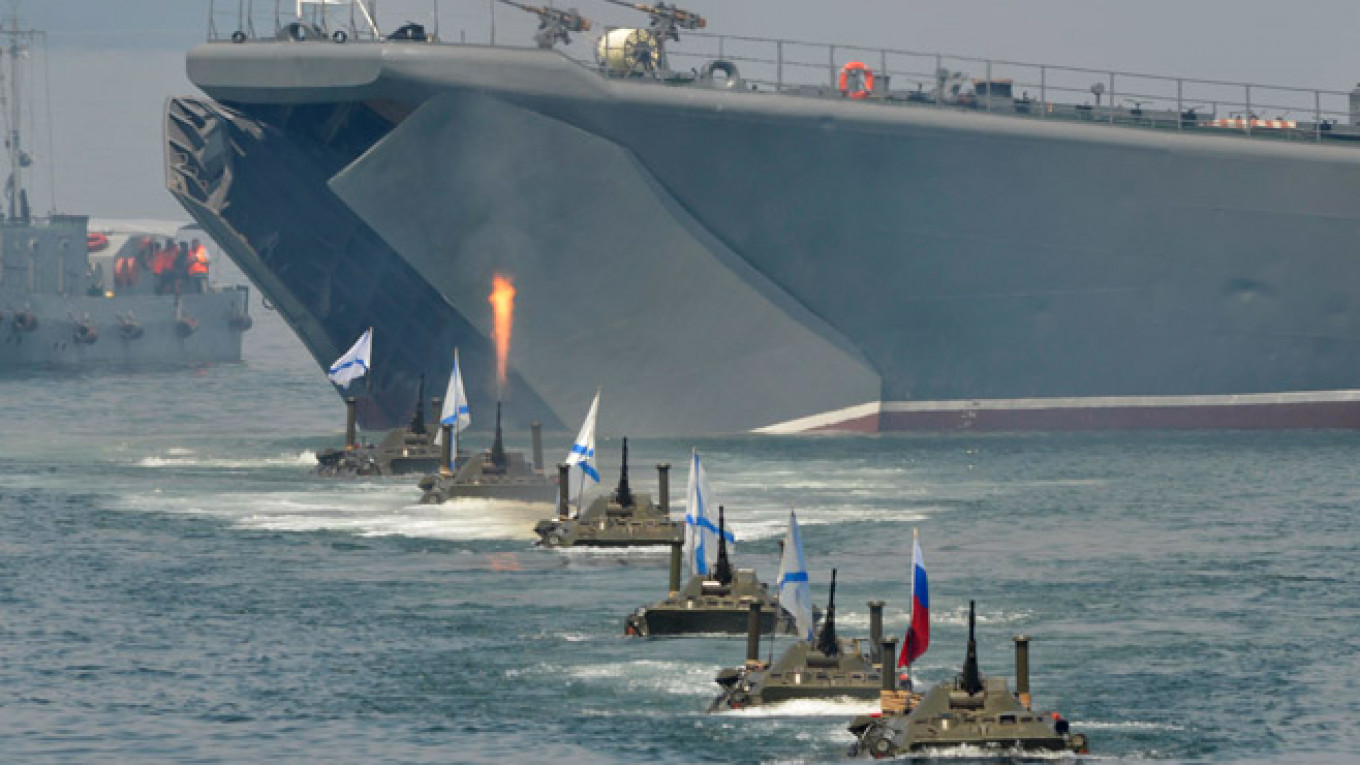The Russian navy said during Sunday’s Navy Day celebrations that a French-made Mistral-class carrier will become the flagship of its budding Mediterranean Fleet, while Western leaders continue to pressure Paris into withholding the delivery of the warships.
Russia ordered two Mistral ships from France in 2011 in a deal worth 1.2 billion euros ($1.7 billion), but events in Ukraine have elicited Western calls for the contract to be torn up amid fears that Moscow has designs on reforging its lost empire. The calls intensified following the downing of Malaysia Airlines Flight MH17 over eastern Ukraine on July 17, which several Western leaders have pinned on Russian-backed separatists in the region.
France has so far stood its ground on the delivery of the first ship, the Sevastopol, which is set to be handed over by the end of 2014. However, Paris has said that the delivery of a second Mistral warship, the Vladivostok, in 2016 depends on Russia’s future behavior regarding the ongoing conflict in Ukraine.
What’s in a Name?
The Soviet Union maintained a permanent presence in the Mediterranean Sea toward the end of the Cold War. Known as the Fifth Squadron, the unit there drew many of its vessels from the Black Sea Fleet, whose base at the Crimean city of Sevastopol put it closer to the Mediterranean Sea than any other Russian fleet.
Some Western analysts have said the first ship will be stationed in Sevastopol, which Russia annexed from Ukraine in March. Given that the ship is called the Sevastopol, that assertion seemed logical.
But logic does not always count for much. A navy spokesman told Interfax on Sunday that the second ship has “every opportunity” to become the flagship of the Mediterranean Fleet by 2016.
If that turns out to be the case, it stands to reason that the Vladivostok will be based in Sevastopol due to the port’s proximity to the Mediterranean Sea.
The port of Sevastopol’s underdeveloped infrastructure makes it difficult to imagine either Mistral being stationed there, but with two years remaining before the Vladivostok joins the Mediterranean Fleet, there is time for the facilities to be brought up to scratch.
The Black Sea Fleet’s admiral, Alexander Vitko, said Sunday that the Sevastopol base is due for some serious upgrades, but he did not say whether a berth for a Mistral carrier was on the agenda, Interfax reported.
“We have begun the construction of new naval stations and airfields,” Vitko said, adding that new aircraft for the fleet have already been flown in, and that new ships will begin arriving this year to receive them.
A port capable of housing and servicing Mistral-class carriers is currently being built in Vladivostok, the home of the Pacific Fleet, and is due to be completed in 2015.
Future Plans
Looking further ahead, the Black Sea Fleet will receive 20 new vessels by 2020, Vitko said during the celebrations in Sevastopol — where, for the first time since the fall of the Soviet Union, combat vessels banded together to put on a live-fire exercise against helpless barges before crowds of Crimean residents gathered on the shoreline.
Vitko said that the festivities were attended by 50 combat units from the Black Sea Fleet, and that the combat capabilities displayed on Sunday were “about 10 percent of what we were able to show.”
A similar display of naval power took place on Sunday at the Northern Fleet’s station of Severomorsk near Murmansk, with President Vladimir Putin in attendance.
Standing aboard the deck of the only aircraft carrier that Russia has ever built, the Admiral Kuznetsov, Putin declared that one of Russia’s primary goals is strengthening the combat capabilities of the Black Sea Fleet.
The rearmament of the Black Sea Fleet, the re-establishment of the Mediterranean Fifth Squadron, and the ongoing saga of the Mistral carriers are taking place against the backdrop of the Russian navy’s larger modernization drive, which itself is part of Russia’s $700 billion military rearmament campaign through 2020.
The Defense Ministry announced Sunday that the navy will receive more than 50 warships and support vessels of various classes by the end of 2014, RIA Novosti reported.
Among these vessels are several new hulls of the Borei- and Yasen-type nuclear-powered submarines, new diesel electric submarines, and a spectrum of support vessels such as patrol boats, rescue boats, minesweepers, transport and assault ships.
The Defense Ministry added that a number of these vessels are destined for the Black Sea Fleet. In the near term, the base at Sevastopol is set to receive six Krivak-class frigates and six Kilo-class diesel-electric submarines. Meanwhile, the Caspian Flotilla will receive several of the new Buyan-class corvettes.
See also:
Under Fire, France Stands by Mistral Warship Sale to Russia
Contact the author at m.bodner@imedia.ru
A Message from The Moscow Times:
Dear readers,
We are facing unprecedented challenges. Russia's Prosecutor General's Office has designated The Moscow Times as an "undesirable" organization, criminalizing our work and putting our staff at risk of prosecution. This follows our earlier unjust labeling as a "foreign agent."
These actions are direct attempts to silence independent journalism in Russia. The authorities claim our work "discredits the decisions of the Russian leadership." We see things differently: we strive to provide accurate, unbiased reporting on Russia.
We, the journalists of The Moscow Times, refuse to be silenced. But to continue our work, we need your help.
Your support, no matter how small, makes a world of difference. If you can, please support us monthly starting from just $2. It's quick to set up, and every contribution makes a significant impact.
By supporting The Moscow Times, you're defending open, independent journalism in the face of repression. Thank you for standing with us.
Remind me later.






